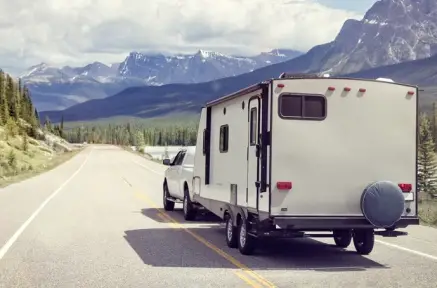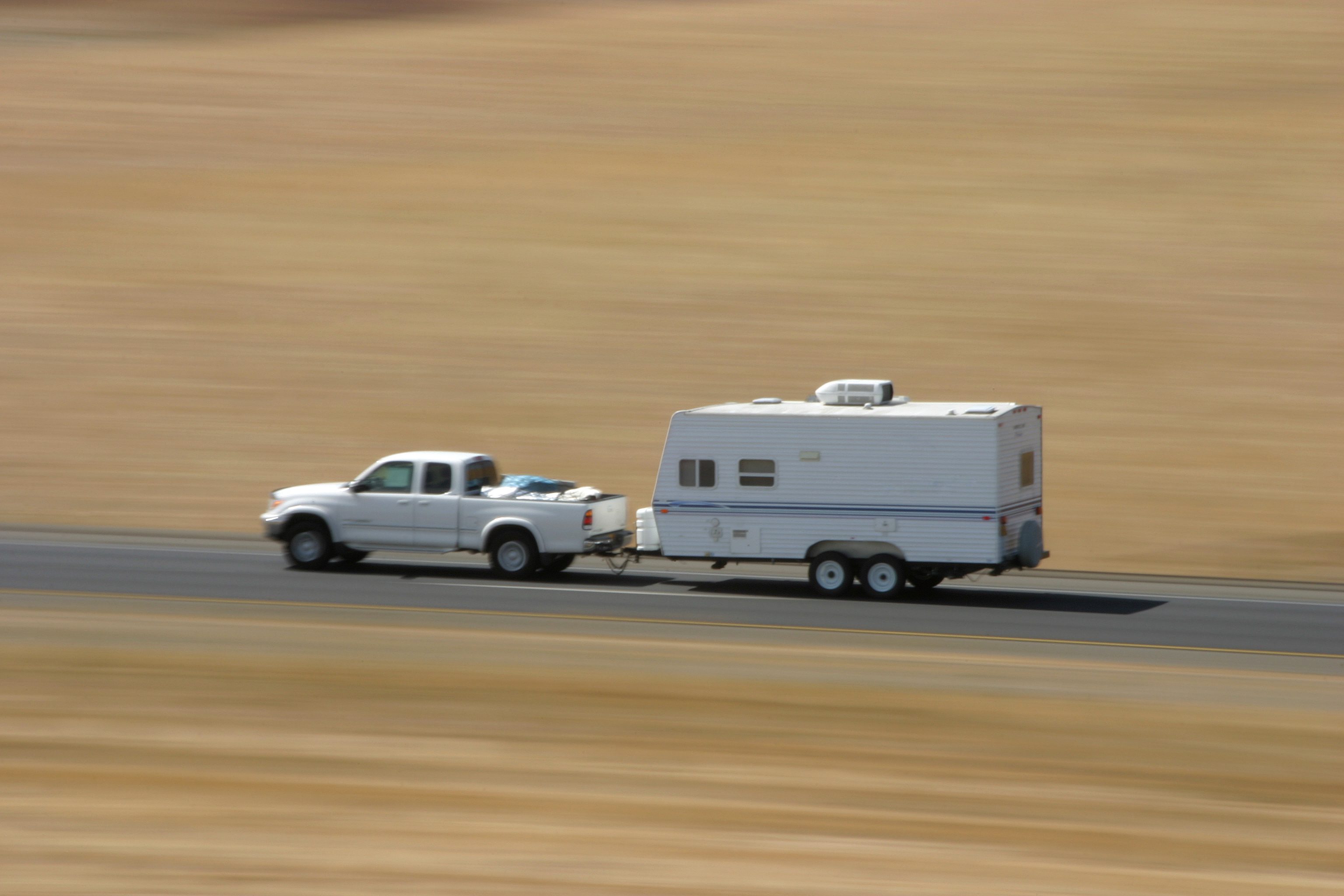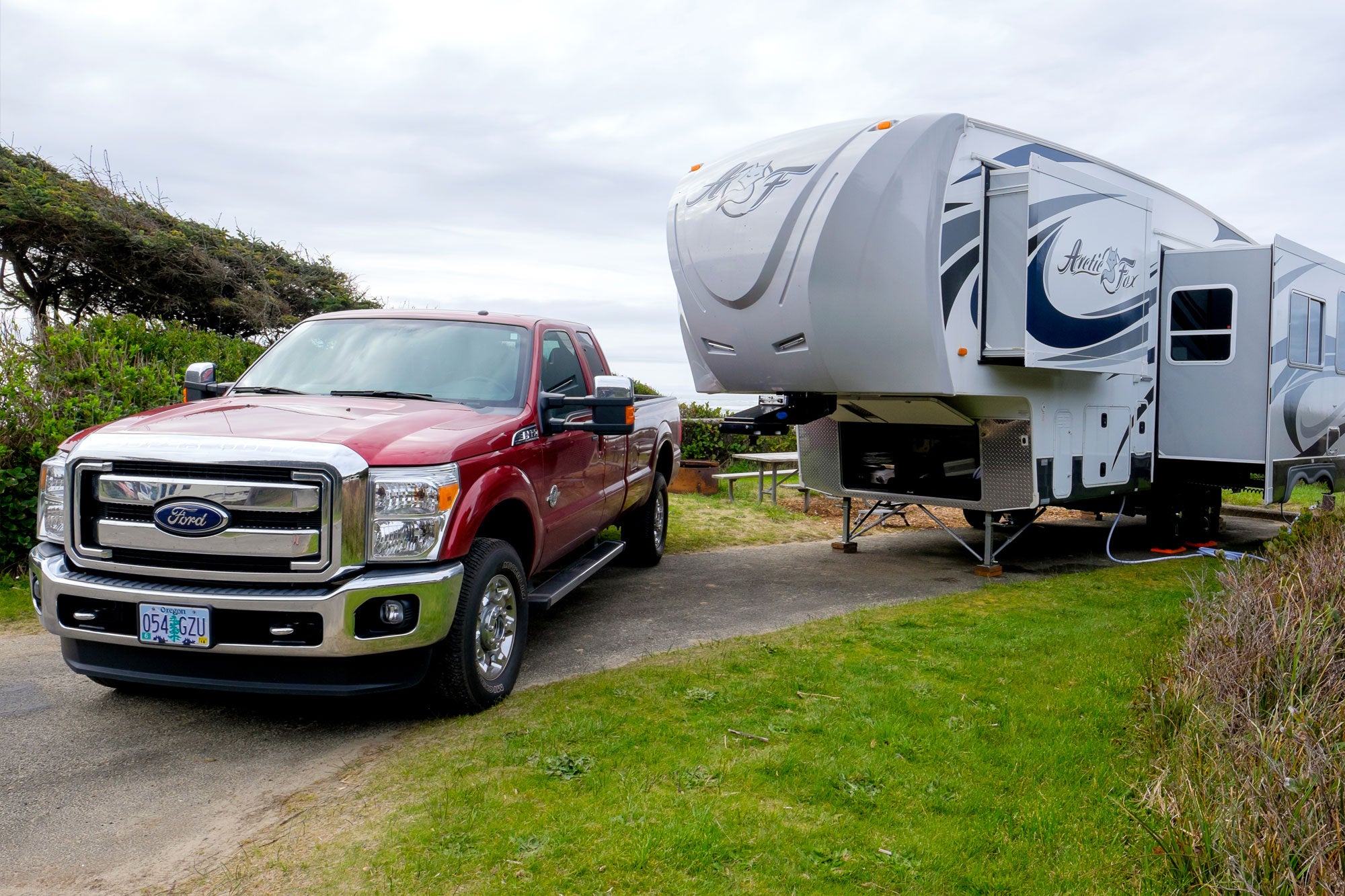
Before you venture into the wild with a camper in tow, there is something important you need to consider. The size and weight of your trailer have a strong impact not only on your safety but also on the vehicle, its expected lifespan and performance.
To keep track of your vehicle’s performance and steering, you need to know exactly what camper you can safely tow. There are quite a few things you need to know about your car or truck:
-
Gross Vehicle Weight Rating (GVWR)
-
Your vehicle's towing capacity
-
Trailer tongue weight
-
Camper’s weight and length
-
Terrain & weather conditions
Thankfully, most of these numbers can be found inside the manuals or online. But you have to do the math yourself and don’t forget about the weight of the equipment you decide to bring along.
:max_bytes(150000):strip_icc()/towing-trailer-56a817de5f9b58b7d0f08e33.jpg)
How to Determine What Size Travel Trailer I Can Tow?
The size and weight of the trailer you want to pull matter a lot. If it’s too heavy to tow with your vehicle, you will put extra strain on the engine, reducing its life and prompting some very expensive repairs. But the frame, wheels, transmission and brakes suffer no less.
|
Vehicle Type |
Towing Capacity Recommendation |
|
Front-wheel drive car or small SUV |
Up to 1500 pounds |
|
Mid-size all-wheel drive SUV |
Up to 3000 pounds |
|
Full-size SUV or half-ton pickup |
5000 pounds or more |
Even when you don’t exceed your towing capacity, the effort it takes to pull so much additional weight still wears out all these parts. So, instead of asking for trouble, we recommend you take just a few simple steps. To check if you can tow an RV of your choice with a vehicle, do this:
-
Check Towing Capacity
Your vehicle's towing capacity is the most important thing you need to know. It can be found in the owner’s manual, on various websites specialized in car specifications, on the official manufacturer’s website, etc. No need to memorize it, just know where to look it up.
If the trailer’s weight nears your max towing capacity, it's not a good idea. The rule of thumb is to keep the camper weight below the maximum capacity to avoid premature part deterioration and repairs.
-
Determine the GTW
So, now you know how much your vehicle can safely tow, and the next step is to figure out how heavy your camper is compared to that. You need to calculate the fully loaded weight of the trailer, including cargo, water, and equipment.
First, look for the VIN sticker on the camper to find how much it weighs. Then, find the equipment and cargo weight and add those numbers.
-
Tongue Weight
Some hitches handle towing better than others. If your vehicle comes with a special towing package, it makes things much easier, but you still need to get the tongue weight measurement. To make sure your vehicle’s hitch can tow a camper, find this spec in the manual.
Typically, the trailer tongue can withstand about 10% to 15% of the trailer's total weight. That number will vary from one tongue to another depending on the materials and model.
-
Payload Capacity
Do not forget about the payload you have aboard the vehicle itself. Subtract the weight of passengers and other items from your vehicle's payload capacity to check if you still have enough capacity for the tongue weight.
-
Consider Weight Distribution
You do not need to calculate or find this before you decide if you can pull a camper. However, we still insist that you should consider how the weight is distributed throughout the vehicle and the RV.
Weight distribution can impact handling and cause all sorts of trouble. It can lead to uneven tire and brake wear, transmission issues and hitch damage.
If you take away only one thing from this article, please remember that you should not reach the max towing capacity while pulling an RV. As long as your camper weight does not exceed reasonable limits, you are good to go!

Factors Beyond Weight
We have discussed how important it is to find out how many lbs your camper can weigh to be towed safely, but what about other factors? The weight and its distribution are not the only things that can influence your stability and maneuverability while towing.
Wheelbase and Stability
Swaying and fishtailing can be both dangerous and annoying while towing. And what else can be better to eliminate these issues if not a longer wheelbase? It's not easy to change, so if your camper’s size does not allow for a longer wheelbase, play with weight distribution, special performance parts and drive carefully.
Length & Maneuverability
The length of your camper trailer also adds to the maneuverability. Longer RVs can be more stable but behave poorly at turns. Keep in mind that longer campers may be more challenging to maneuver in tight spaces or navigate through narrow roads.
Height & Clearance
Bridges, garage ceilings and narrow passes can be difficult to drive through if your camper is too tall. But some additional inches of ground clearance can work wonders on uneven terrain.
Remember these factors, as well as weight, to determine what size camper you can safely tow. This will help you improve the experience whenever you go outside for a weekend in the wilds.
What Towing Capacity Do I Need for a Small Camper?
Typically, travel trailers can weigh anywhere from 500 lbs to 4,000 lbs+. Most mid-size vehicles and SUVs can manage to pull a small-sized camper with a payload. Even a sedan can easily tow smaller campers as long as their weight stays within safe towing limits.
|
Camper Weight Range (lbs) |
Recommended Towing Vehicle |
|
Up to 3,500 |
SUV, Mid-size Pickup Truck |
|
3,500 - 4,000 |
Full-Size Pickup Truck |
|
4,000 and above |
Full-Size Pickup Truck |
Basically, you will need up to 2,000 lbs of towing capacity to pull a small camper. Everything else will be too heavy to be considered a small RV. But however small your camper is, always check if it exceeds your towing capacity.
Calculating Your Towable Weight
Another thing to consider before trying to pull an RV is towable weight. To get this measurement, take the curb weight of your truck without any additional cargo or passengers from the manual. And then substruct it from the Gross Combined Vehicle Weight Rating (GCVWR).
For example, if your truck's curb weight is 5,000 pounds and the GCVWR is 10,000 pounds, your towing capacity would be 5,000 pounds.
This is a very important specification, but it doesn’t mean you can neglect the tongue weight and other important factors. Always use it with other measurements to see the whole picture.

Can You Pull a Camper with an SUV?
Yes, some SUVs can tow a small camper, but there is a catch. If your SUV leans toward more lightweight smaller SUVs, it might lack the power to pull a full-sized camper trailer. This is mostly true about the SUVs based on the chassis similar to the one used in sedans.
RV experts from TOGO RV assure that you can still tow cargo trailers and tiny RVs weighing up to 1,200 lbs with the most petite SUV. But do not expect to do any serious towing with it.
Thankfully, there are more than enough mid-sized SUVs that can tow any camper you want. Vehicles like the newest Dodge Durango, Audi Q7, Land Rover Defender or Jeep Grand Cherokee can tow campers up to 8,000 lbs. They also have better ground clearance and engine capacity to perform well off-road.
But regardless of how wonderful SUVs can be, nothing can beat a good old truck when it comes to towing campers. These beasts have enough horsepower and torque to deal with anything you throw at them.
If you are seriously passionate about camping with an RV, we recommend opting for a truck instead. SUVs are just not meant for towing or real hardcore off-roading.
Can I Pull a Camper with a 4-cylinder?
Engine output is extremely important when it comes to towing anything, not only campers. The SUVs with 4-cylinder engines are usually powerful enough to tow small campers. Generally, 4-cylinder engines have less towing power than larger engines, such as V6 or V8.
Smaller engines may struggle when towing heavier loads, especially uphill or in demanding driving conditions. And while your SUV might work well on an even road, as soon as you encounter any difficult terrain or hills, it might begin to show signs of trouble, from dramatically reduced fuel efficiency to overheating.
Consider the type of terrain and driving conditions on your way while towing a camper somewhere. A 4-cylinder SUV might require some additional preparations, like reducing the weight of cargo or planning on the best route to refill the tank, or just letting the transmission cool down once in a while after a particularly steep hill.
Remember, this is not about the engine but about the vehicle’s towing capacity versus your camper’s weight. If the camper remains within the limits, you can tow it and enjoy a good RV experience. If the weight exceeds the capacity, it doesn’t matter how many cylinders you have at all.
Can an SUV Pull a Teardrop Camper?
Any SUV with a towing package and enough towing capacity can pull a teardrop camper without any issue. This is one of the more light and small camper options you can choose from. It can only provide some limited and basic comfort and works for smaller groups and families.
Since its weight rarely exceeds 2,500 lbs, this particular camper type is acceptable for almost any SUV. Its compact size guaranteed its popularity among RV enthusiasts.
But anyway, before buying a camper, you should check your SUV's towing capacity and consider the cargo weight. Another important thing is how you are going to pull the camper. If your SUV does not have a preinstalled towing package due to trim level, consider upgrading these parts for safety reasons.
What Is a Normal-sized Camper?
There is no such thing as a normal size for a camper. It all depends on how much space you really need. Camper size determines how much space you have to make it cozy inside, add furniture and camping equipment.
Camper Size by Type
|
Camper Type |
Length Range (in feet) |
Description |
|
Pop-up Campers |
8 - 20 |
Lightweight campers with fold-out features and tents |
|
Truck Campers |
8 - 20 |
Campers designed to be loaded onto pickup truck beds |
|
Class B Motorhomes |
16 - 22 |
Compact camper vans built on van chassis |
|
Travel Trailers |
15 - 35 |
Towable campers with living, kitchen, and bathroom areas |
|
Class C Motorhomes |
22 - 32 |
Larger motorhomes with attached cab section |
|
Fifth-Wheel Trailers |
25 - 40 |
Towable trailers requiring specialized hitch in a truck bed |
But there can be too much of a good thing. When you look for a larger trailer, remember that its length and width will influence handling and maneuverability. Larger trailers become extremely difficult to park somewhere, pass through narrow spaces, and under low bridges.
What Size Vehicle is Needed to Pull a Camper?
Usually, the vehicle must be at least mid-sized to be able to tow a camper trailer. An average mid-sized truck, minivan or even an SUV is big enough to pull a small RV. But the size itself usually doesn’t matter as much as towing capacity, engine output and other important specifications.
The size, however, can determine how well the vehicle handles while towing a trailer. A longer wheelbase gives more stability and prevents sway, for instance. But size can also harm your maneuverability in narrow spaces and during particularly tricky turns.
Another thing to consider is the camper’s size. The heavier the camper, the bigger the vehicle must be. Smaller SUVs, for example, lack the structural strength, power and towing capacity to pull campers beyond 2,000 lbs. So, if you need a bigger camper, maybe, you need to have a larger vehicle to match it.
For big five-wheel camper trailers, you will need a full-size truck, no less. These beasts require extra durability from suspension, transmission and engine not to break your precious vehicle. Only heavy-duty trucks can handle such strain during towing.

Is It Hard to Pull a 30-foot Camper?
Yes, for most vehicles, it can be really hard to tow a 30-foot camper trailer. Only heavy-duty trucks with a towing package can be fit for the task at hand. Even without extra feet towing is a challenging thing for any SUV, minivan and even mid-sized trucks.
It puts too much stress on critical systems like engine components, suspension, frame, brakes and transmission. That’s why you need to be extremely careful with regular camper trips or towing at full capacity. This hobby requires more frequent check-ups and serious maintenance.
A 30-foot camper is almost as large as they get. You will hardly find anything bigger than that at a national park because it simply won’t fit! And with size arises another issue, weight.
An average 30-foot camper can weigh somewhere between 5,200 and 5,800 pounds on its own without any necessary equipment. And when you take your camper out, you will need to fill water tanks, get some edible supplies, cooking and camping equipment and a few fun humans with their cargo.
All that combined can easily max out towing capacity of most SUVs and smaller trucks. Too much is too much. Exceeding your towing capacity can be extremely dangerous to your vehicle. So, we advise against playing with fire and towing at your full capacity.
Same articles

Understanding Vehicle Inspection and Verification Services: Why They Matter for Every Driver
GuidesVehicle inspection and verification services are an essential but often overlooked part of keeping roads safe and cars legally compliant. Most people only think about inspections when it’s...
KLIFEX Brand Overview: High-Quality Automotive Repair Kits for Affordable Repairs
GuidesThe automotive aftermarket has long needed solutions that combine reliability, durability, and affordability. Many car enthusiasts and services are looking for a way...
Fast, Reliable Vehicle Emissions & Inspection Services Made Simple
GuidesFast, reliable emissions and inspection services are essential for keeping vehicles road-ready, compliant with environmental regulations, and safe for daily driving. If you’re looking for quick...

